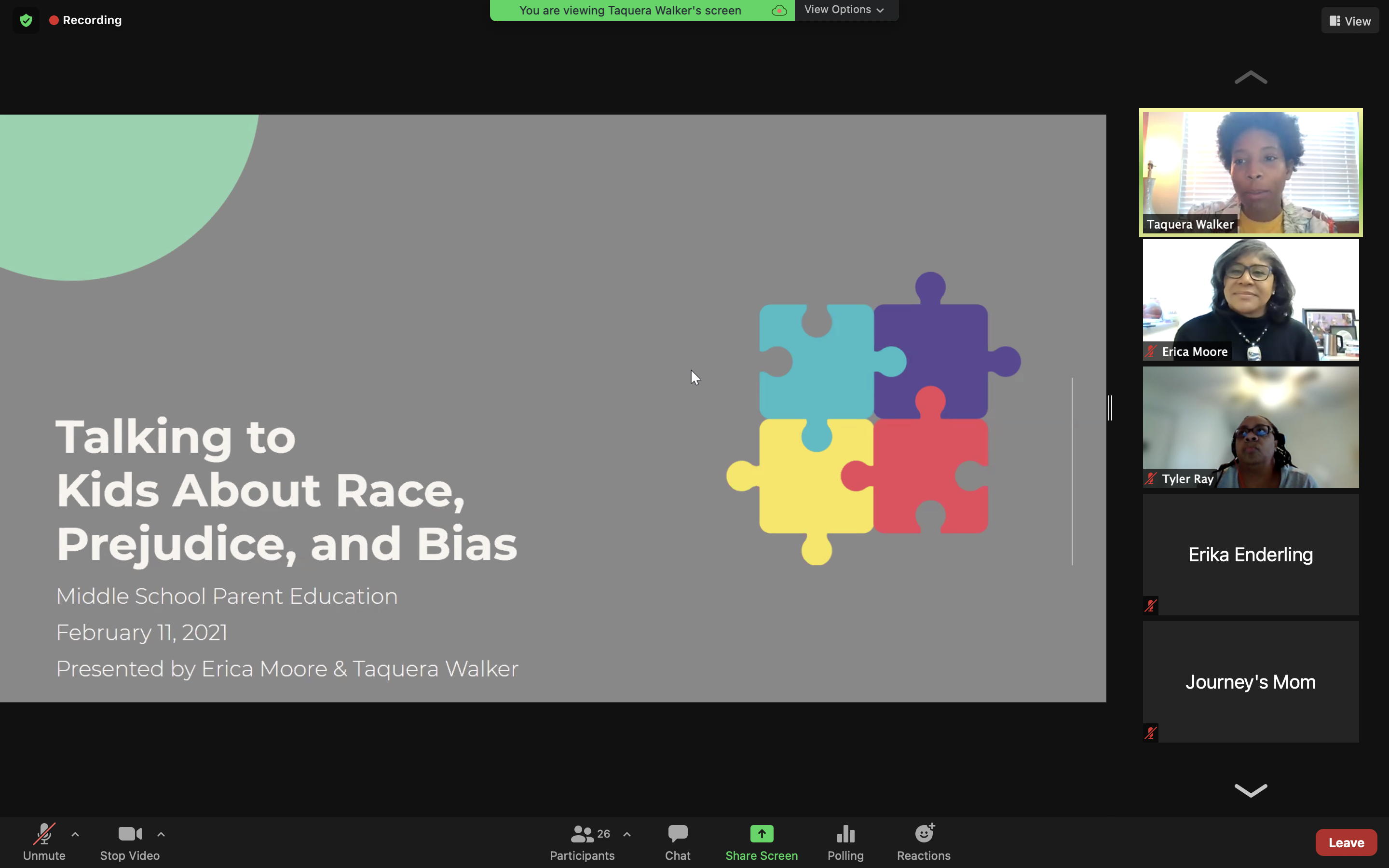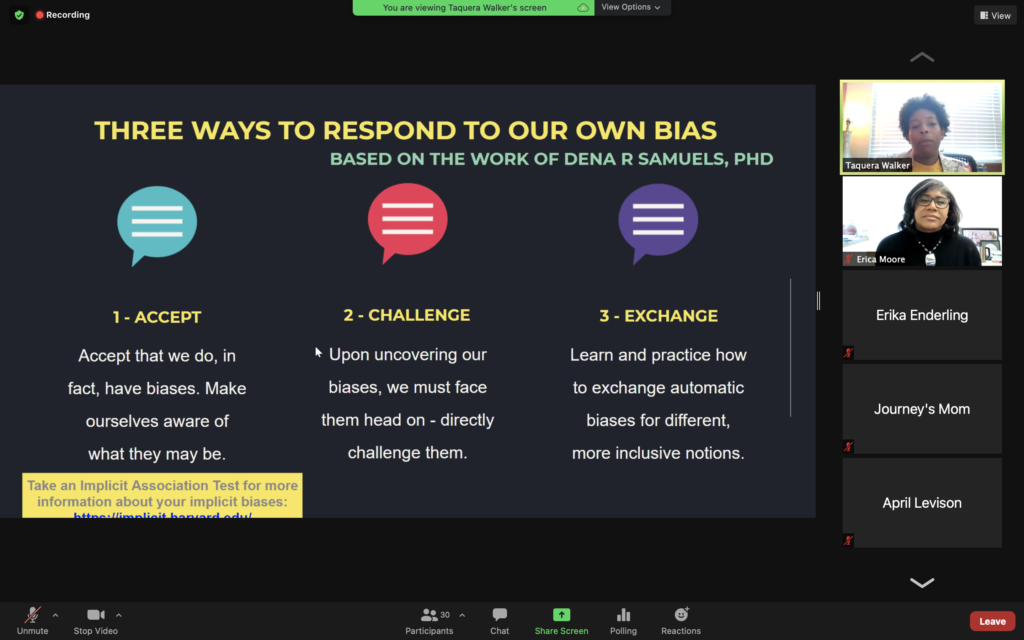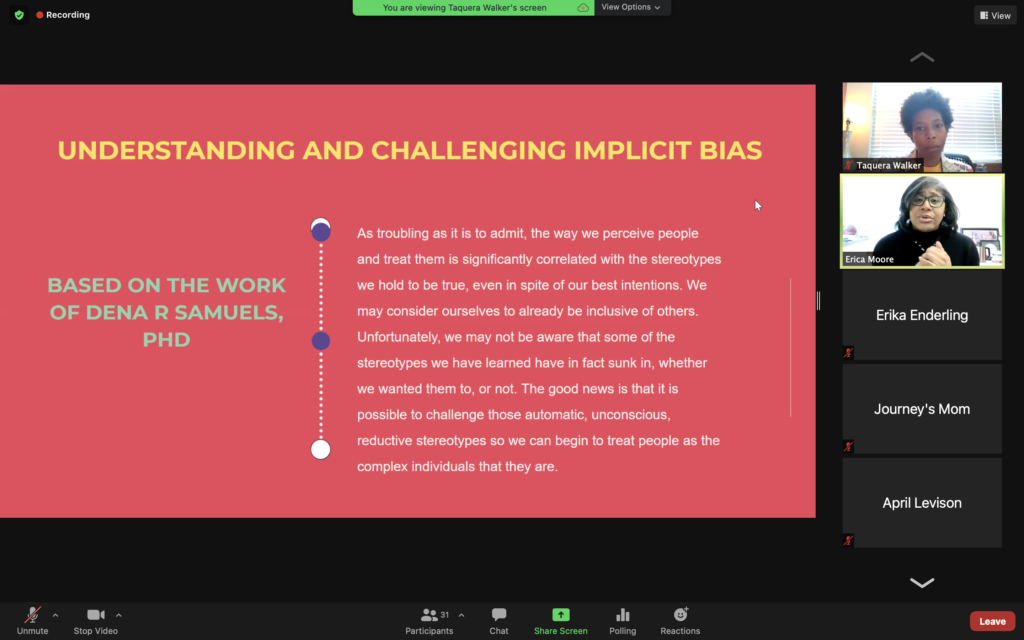Taquera Walker, Middle School Counselor, and Erica Moore, Director of Faculty Equity and Inclusion and Director of Student Activities, met with a group of Middle School parents for a conversation about talking to kids about race.

Walker started by explaining that it’s okay to be uncomfortable. These are messy conversations. If we were comfortable, we wouldn’t need to have these conversations. Moore emphasized this point, saying that the goal of the conversation is not to shame or blame anyone, or make anyone feel guilty. It’s an opportunity for us to lean into learning and to engage with each other.
Moore then continued by setting up a clear framework for participants to understand exactly what the terms mean in these conversations and went through definitions of race, racism, racist, structural racism, racial equity, racial justice, and antiracist. Having common definitions helps ground us in the work of talking about race. There are different definitions of what it means to be antiracist, but the common thread is opposing racism in both words and action, and opposing it in ways of practice, policies, treatment, and access.

How do you talk to your students about race? There are several things important things to keep in mind:
- We’re all uncomfortable talking about race, even though it can affect every single person regardless of their race. Be open to the conversations and don’t avoid talking about current events. Don’t shy away from those conversations.
- It’s okay to be uncertain. Educate yourself, process your own thoughts and feelings, and lean into your vulnerability. Share that you’re uncomfortable with your student. Walker added that we didn’t learn these things in school, so it makes sense that we aren’t sure how to have this conversation but to know it’s important and worth trying.
- Connect to something students are learning, whether that’s in history class, in English class, in advisory, or in any part of their lives. They are constantly learning about racism. Start the conversation by asking questions: What did you see/hear, how did it make you feel? What do you think about that? What questions can I answer for you?
- If you still have anxiety or need help, seek support from others such as parents, teachers, and DEI practitioners like Moore and Walker. They are always open to talking about how to have conversations about race.
- Prepare yourself to enter the conversation with students, not for them or to them, but with them. Be willing to listen and learn, and acknowledge what you don’t know. Even though it’s messy and uncomfortable, it’s important for everyone to participate in order to make a difference.

Moore explained that we’re all on different parts of the same spectrum when it comes to talking about race. Actors are those who are more like spectators, who observe what is happening but do nothing to disrupt the status quo. Allies educate others and disrupt in spaces where racism is present. Accomplices directly challenge institutional racism. Moore said that regardless of where we are on the spectrum there is no judgment, but it’s important to start and to lean into the difficult conversations.

Walker covered implicit bias and what it means to understand and challenge our own implicit biases. We may consider ourselves to be inclusive, but some of the stereotypes we have learned have sunk in whether we want them to or not. The good news is that we can work to change our own automatic, unconscious, reductive stereotypes and begin to treat people as the complex individuals they are.
What do we do with implicit biases? First, we need to accept we have them and uncover what they are. She gave a fun example of if your child is a picky eater, we can say they have an implicit bias against broccoli. Just because you have bias doesn’t make you a bad person or a racist. Having a bias makes you more human than anything else, and accepting it allows you to move forward and challenge it. We may start to feel shameful that these automatic thoughts come into our heads. It’s okay, but it’s important to recognize them. Second, challenge those thoughts. Third, exchange your implicit biases for different, more inclusive notions. The easiest way to do this is to spend time with other people who can challenge our biases, actively moving into places with people who will challenge us. She mentioned the International Institute’s annual Festival of Nations as a great place to explore other cultures, and Moore advised supporting BIPOC businesses. (BIPOC stands for Black, Indigenous, and People of Color.)
Approaches for challenging bias, prejudice, and stereotypes:
- Acknowledge and embrace differences.
- Avoid making assumptions about others.
- Identify and utilize counter-stereotypic examples.
- Increase exposure and interaction with people who are different than you.
- Build relationships across differences.
- In spaces that you occupy, ask yourself: “Who is in this room? Whose voices are heard?
- Whose voices are missing from this conversation? Why may this be?”
- Be accepting of mistakes. Be patient with yourself and others, and keep trying as you work to create spaces of belonging and inclusion for all.

It’s important to provide opportunities for your family to experience race, resilience, and resistance in the community. Moore shared that there are resources available to accommodate any learning style, including books, podcasts, articles, and videos. See below for a great list to start.
The bottom line is that we are all in different places on this journey. Some of us are new to the conversations and some of us have been having them for a long time. It may be hard to get started, but Walker and Moore encourage everyone to lean into their vulnerability. Don’t be afraid to say, “I’m not sure how to lean into this, but I really want to know.” This is a messy conversation; you want to say the right thing, but there’s no easy way for anyone to engage in it. If you need help, Walker and Moore are available and happy to talk, or you can find other professional practitioners that will help with your journey.
Thank you to Ms. Walker and Ms. Moore for their open, engaging discussion today, and for providing resources and answers on this important topic.
Resources
Resources shared by parents
- Test your own implicit biases
- NPR article on government involvement in segregation


